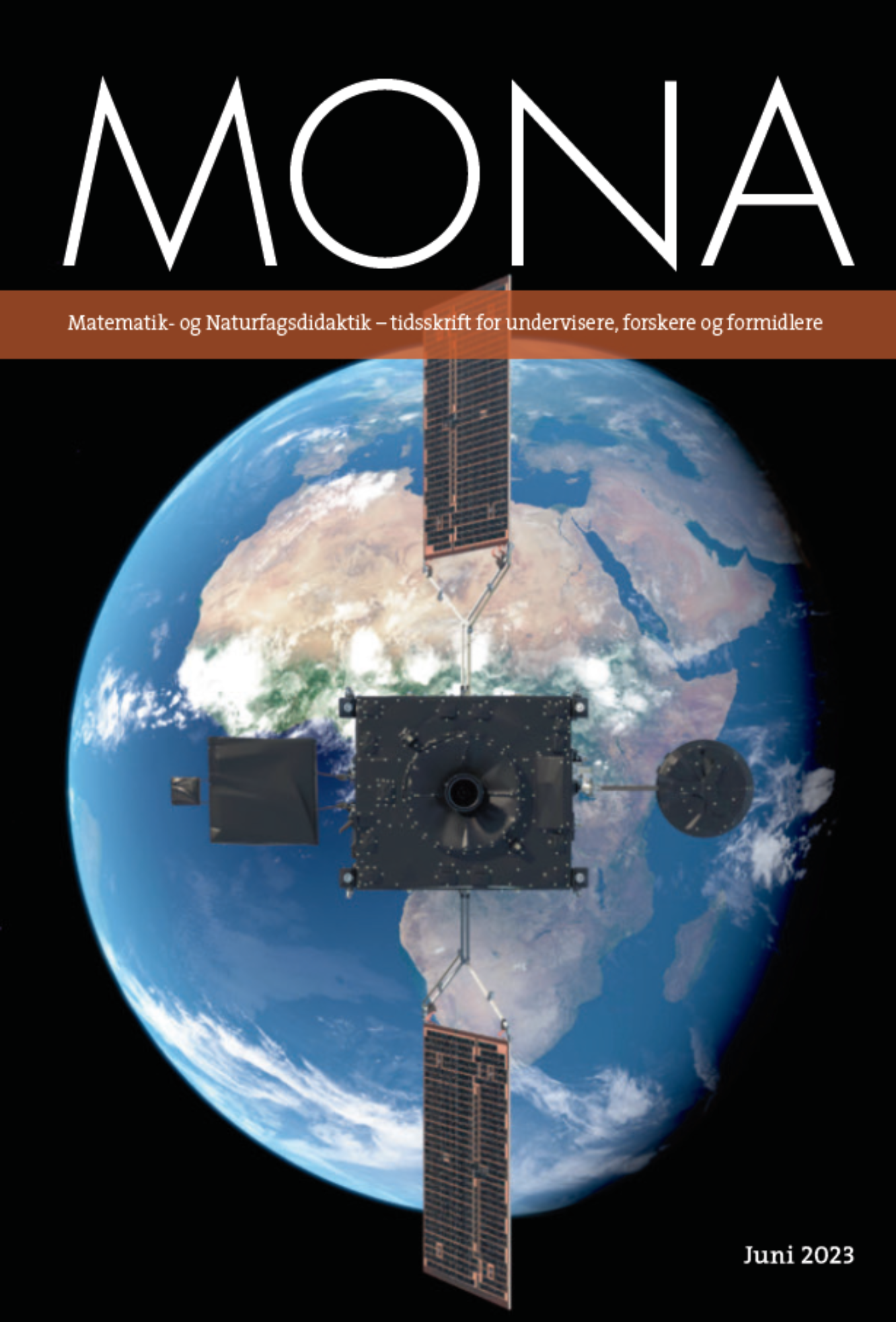Resumé
Abstract: Science capital-begrebet har vist sin værdi ved at beskrive forholdet mellem elevers kulturelle og sociale baggrund og deres naturfaglige ambitioner. Den grundlæggende antagelse i nærværende undersøgelse er at naturfagslærere også skal besidde en naturfagskapital for at engagere og motivere eleverne. Artiklen foreslår en teoretisk ramme for kategorier omhandlende naturfaglig kapital tilpasset lærere. Rammen er blevet anvendt på et pilotstudie hvor et team af naturfagslærere er blevet interviewet om deres fagligt inspirerede fritidsinteresser, -aktiviteter og -inspirationer, og deres udsagn er blevet
analyseret for indikationer på naturfaglig kapital. Den teoretiske ramme og tilhørende metode giver mulighed for at få adgang til de personlige og sociale baggrunde for og inspirationer til undervisning i naturfag.
Referencer
Archer, L., Dewitt, J. & Willis, B. (2014). Adolescent Boys’ Science Aspirations: Masculinity, Capital and Power. Journal of Research in Science Teaching, 51(1), s. 1‑30.
Bourdieu, P. (1986). The Forms of Capital. I: G. Richardson (red.), Handbook of Theory and Research for the Sociology of Education (s. 241‑258). New York: Greenwood.
Carlson, J. & Daehler, K.R. (2019). The Refined Consensus Model of Pedagogical Content Knowledge in Science Education. I: A. Hume, R. Cooper & A. Borowski (red.), Repositioning Pedagogical Content Knowledge in Teachers’ Knowledge for Teaching Science (s. 77‑105). Singapore: Springer.
Christidou, D., Papavlasopoulou, S. & Giannakos, M. (2021). Using the Lens of Science Capital to Capture and Explore Children’s Attitudes Toward Science in an Informal Making-Based Space. Information and Learning Sciences, 122(5/6), s. 317‑340.
Claussen, S. & Osborne, J. (2012). Bourdieu’s Notion of Cultural Capital and Its Implications for the Science Curriculum. Science Education, 97(1), s. 58‑79.
Eisenhart, M. (2008). Generalization from Qualitative Inquiry. I: K. Ercikan & W.-M. Roth (red.), Beyond Qualitative and Quantitative Polarization. p51‑66. New York: Routledge.
Elmose, S. & Wogensen, V. F. (2019). Undersøgelse af model for kompetenceløft – med fokus på naturfagslæreres udbytte. MONA, 2019(4). P. 49‑67. København: Institut for Naturfagenes Didaktik, Københavns Universitet.
Elmose, S. (2021). Science Culture and Continuing Training of Science Teachers. I: M.K. Sillasen, P. Daugbjerg, S.O. Rebsdorf, B.L. Nielsen & S.W. Clausen (red.), Science Education in the Light of Sustainable Development: Trends and Possibilities. Proceedings of the 13th Nordic Research Symposium on Science Education (s. 131‑139). Aarhus: VIA University College.
Grenfell, M. & Lebaron, F. (red.) (2014). Bourdieu and Data Analysis: Methodological Principles and Practice. Bern: Peter Lang AG, International Academic Publishers.
Fauth, B. et al. (2019). The Effects of Teacher Competence on Student Outcomes in Elementary Science Education: The Mediating Role of Teaching Quality. Teaching and Teacher Education, 86. s. 51‑86. Amsterdam: Elsevier.
Henze, I. & Barendsen, E. (2019). Unravelling Student Science Teachers’ pPCK Development and the Influence of Personal Factors Using Authentic Data Sources. I: A. Hume, R. Cooper & A. Borowski (red.), Repositioning Pedagogical Content Knowledge in Teachers’ Knowledge for Teaching Science (s. 201‑221). Singapore: Springer.
Hume, A., Cooper, R. & Borowski, A. (red.) (2019). Repositioning Pedagogical Content Knowledge in Teachers’ Knowledge for Teaching Science. Singapore: Springer.
Ikonen, K. et al. (2020). Gender and the STEM Fields in Education- and Career-Related Discussions between Finnish Parents and their Adolescent Children. Journal of Research in STEM Education, 6(2), s. 115‑137.
Jidesjö, A., Westman, A. & Oscarsson, M. (2021). Trends and Developments in Student’s Interest in Science and Technology: Results from the Relevance of Science Education Second (ROSES) Study in Sweden. I: M.K. Sillasen, P. Daugbjerg, S.O. Rebsdorf, B.L. Nielsen & S.W. Clausen (red.), Science Education in the Light of Sustainable Development: Trends and Possibilities. Proceedings of the 13th Nordic Research Symposium on Science Education (s. 149‑158). Aarhus: VIA University College.
King, H., Nomikou, E., Archer, L. & Regan, E. (2015). Teachers’ Understanding and Operationalization of “Science Capital”. International Journal of Science Education, 37(18), s. 2987‑3014.
Kvale, S. & Brinkmann, S. (2015). Interview. Det kvalitative forskningsinterview som håndværk. København: Hans Reitzels Forlag.
Nomikou, E., Archer, L. & King, H. (2017). Building “Science Capital” in the Classroom. School Science Review, 98 (265), s. 118.
Olsen, H. (2003). Kvalitative analyser og kvalitetssikring. Tendenser i engelsksproget og skandinavisk metodelitteratur. Sociologisk Forskning, 40(1), s. 68‑103.
Serup, S.D. (2021). SNL-håndbog. Alt det vigtige fra Stærke Naturfaglige Læringsfællesskaber – kort fortalt. Aarhus: VIA University College. Lokaliseret den 8. februar 2023 på: https://static1.squarespace.com/static/5f87f65a9218ff1a0227dc10/t/61a5f3714d0dd626ecd5ca75/1638265830822/SNL+h%C3%A5ndbog.pdf.
Shulman, L.S. (1987). Knowledge and Teaching: Foundations of the New Reform. Harvard Educational Review, 57(1), s. 1‑22.
Sillasen, M.K. & Valero, P. (2011). Natur/teknik og den naturfaglige kultur i Folkeskolen – Evalueringsrapport. Aalborg: Aalborg Universitet.
Sunesen, M.S.K. (2016). Læreres og pædagogers oplevede læringsudbytte af et pædagogisk kompetenceudviklingsforløb – med inklusion som eksempel. Ph.d.-afhandling. Aarhus: DPU, Aarhus Universitet.
Sølberg, J. (2007). Udvikling af lokale naturfaglige kulturer. Ph.d.-afhandling. København: Danmarks Pædagogiske Universitetsskole, Aarhus Universitet.
Sølberg, J. et al. (2015). Innovation, science og inklusion 2015. Slutrapport af ISI 2015. København: Institut for Naturfagenes Didaktik, Københavns Universitet.
VIVE (2021). SCOPE Project Flow. Lokaliseret den 8. februar 2023 på: https://www.vive.dk/da/projektforloeb/scope/.
Wilken, L. (2020). Pierre Bourdieu. Den praktiske sans. Tidsskrift for Professionsstudier, 16(30), s. 122‑126.

